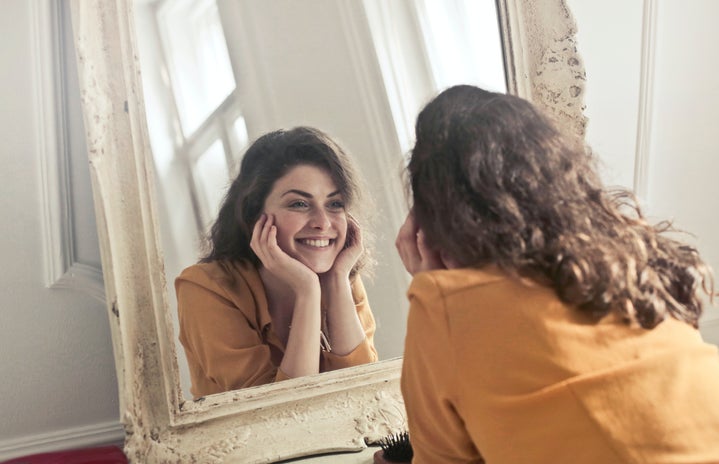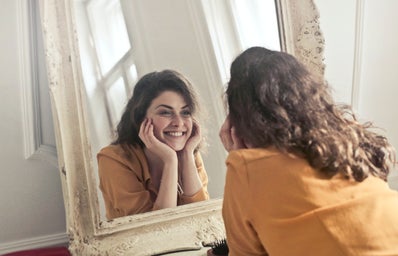Humans like to curate their own image. Many of us care greatly about how we look, how we come off to other people, and how they think of us while we are gone. In general, many of us are concerned about how we’re perceived. I think that this is fairly normal — we want to be considered good or attractive by the people around us. What’s a little more sinister, and probably a little less healthy, is this idea that we must curate ourselves for everybody all the time. The idea is that even when we are alone, we are still somehow performing for an invisible audience. Making our lives into a cinematic narrative, rather than organic life. I’m sure there are other factors leading to this need to perform (especially for women — we’ll put a pin in that and explore it later), but one idea I really want to explore is this need to be “The Main Character.”
“I’m the main character,” “She’s definitely the main character,” and “This is giving main character energy” are some things you might’ve either heard in real life or seen on social media. While “main character energy” doesn’t seem to have a concise definition and mostly seems to go off of subjectivity, it’s certain that being seen as the main character is a positive thing. This makes sense, as the protagonist in a story is usually the most interesting or important character in said story, with all the events mostly concerning them. According to therapist Kate Rosenblatt, “‘Main character syndrome’ refers to identifying as the protagonist in your own life story.” The term seems to originate from a trend on the social media app TikTok, encouraging people to see themselves as their own protagonist.
Is there a problem with seeing yourself as the protagonist of your life? That’s complicated. On the one hand, it’s the sort of perspective shift that could make you more confident in yourself and more invested in your own life by treating it as a story rather than normal mundane life. It might also encourage you to start putting yourself first, which can be a difficult lesson to learn in the journey of self-care.
Others may rebuke this “main character energy” mindset with the idea that it makes you a narcissist. In my opinion, the narcissism issue really depends on who decides to take on this mindset. The more pressing matter at hand, to me, is this pressure of curing the perfect protagonist presentation. If your life is a movie, how do you deal with the idea that your narrative is being consumed? How do you deal with this idea that you are constantly presenting and performing to others, real or not?

I think that one way this performance idea manifests itself is our generation’s obsession with aesthetics. Don’t get me wrong, I think that exploring and getting excited about certain styles and fashions that appeal to you is absolutely something anyone should be encouraged to do! Wearing what you want, whether it fits into a clear-cut aesthetic or not, is something everyone should be able to do. What I’m more so referring to is the idea that aesthetics are unbreakable boundaries you must fit into and never stray from. If you’re trying to be a certain archetype, making a character out of yourself, it can feel like there’s pressure to only wear one type of clothing to fit into said aesthetic. You may not want to stray from what people perceive you as, especially if these aesthetics are also linked to personality types. While I myself have even discouraged myself from trying styles outside of what I perceive to be my aesthetic (but could very well be going completely unnoticed by others), I do think that if you want to try a new style that is “outside” of your current aesthetic, you should! In real life, we have to wear clothes every day, and it’s not always realistic to curate the perfect outfit that also happens to match whatever is trending on Pinterest or TikTok.
Performance doesn’t just refer to the way you’re dressing–if you’re constantly worried about being perceived by some outsider perspective, you’re also careful about your mannerisms, your word choice, and your image. Anything that would dull your “main character energy,” anything that might come off as boring or awkward or embarrassing, feels ten times more concerning when you’re performing for some kind of unseen audience.
Very quickly I want to discuss how this kind of mindset affects women and girls specifically. While the topic deserves its own more in-depth article, in short, women have been represented through a male lens in the media for so long that it’s understandable how it would feel necessary to constantly perform for that male gaze. Even if it’s something women don’t consciously do, the societal pressure to constantly be pretty and appealing has great roots in this male gaze.
If you like to romanticize your life and feel as if you’re the main character, more power to you if it brings you joy. However, I do think it’s easy for us to accidentally get caught up in this obligation to be “performing” as that main character, whether there’s an audience around us or not. Self-love is most important, so it’s crucial to be assessing how you feel about yourself before you calculate the way everyone around you is perceiving you. Your life isn’t a performance, it’s yours to do whatever you like that makes you your happiest self.




